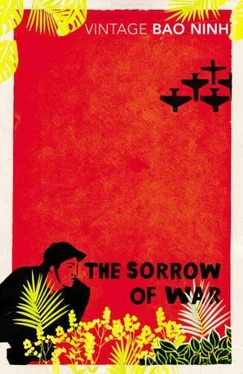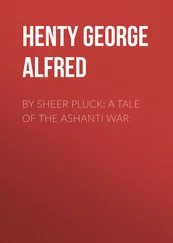‘Stay overnight’ Phuong whispered to him. ‘The train will be gone long before the all-clear siren. Stay!’
Kien, in fear of a charge of desertion, shook his head sadly.
‘No? Well we can’t wait here. We’ll have to take the cyclo. The coward can find it later,’ she said.
Kien was reluctant.
‘Pedal!’ she ordered. ‘We’ll teach this chicken-hearted rider a lesson. The posters tell us to direct all efforts to the front line, so let’s do it!’
Kien laughed. Of course, she was right. Phuong jumped into the seat and he got onto the cyclo and started pedalling. It was dangerous, as they were the only ones in the empty streets and the guards might arrest them. But as they neared the station the all-clear sounded, a signal for them to burst into ecstatic laughter. Speeding down the final, empty streets to the station, their laughter echoing from empty shopfronts, catching a train to the war. Sensational!
‘And what about the look on his face when he comes out from the shelter?’ they shouted, and laughed again.
But the train had gone. Battalion 36 was heading for the front. The entire force, except for one deserter.
The penalty for desertion was the firing squad.
Stunned and embarrassed, Kien stood on the now empty station, staring into the distance along the empty lines.
An unperturbed station master told them the train would stop at Dong Van or Phu Ly. ‘Can’t really tell. It’s a troop train,’ he said, looking at Kien.
Phuong tried to lighten his mood. ‘The score’s one-one,’ she said. They’d both missed their trains.
‘Look. All’s not lost. Let’s hitch a ride to the next station. This is wartime, there’ll be plenty of ways to deal with this problem. Let’s get something to eat, first.’ She spoke quickly, to allay his fears.
‘God, you look exhausted!’ she added suddenly.
As they stood there, his war had started.
Battalion 36 had travelled to Van Trai, in the south-west. While Kien was making tracks to catch up with the other new recruits who were by then as far south as Cu Nam, B52 bombers had struck, giving them a nasty welcome to the war.
The battalion commander, who had threatened the Hanoi boys with desertion charges if they missed the train, had been one of the first to be killed. The bombers had struck first at Van Trai station, the battalion taking heavy casualties. They had then been dispersed, some continuing south by road and the others ordered to sea to continue their move south. But the B52s struck again, sinking all the sea transports, and by the time Battalion 36 had been regrouped on land there were hardly any men left and those few continued as supplementary units to others, down Road 9 to the front.
A dozen recruits went to the front. Throwing a dozen untrained men into that battle would be as effective as throwing an ice-cube into a blazing furnace.
Kien, unaware of the raids because of the wartime blackout on news, especially bad news, was still hours behind when the attack came. It was not until ten years later that he heard the details: strangely, it was on the peace train from Saigon in May 1975 that the story emerged.
One of the survivors of the attack had been his deputy commander, Huy. By chance, Huy was in the same compartment on the peace train. By then he had been blinded but Kien recognised him at once and called his name. Huy, however, had forgotten Kien.
‘The luck of the unlucky,’ he said to Kien, on hearing how he’d missed the train. ‘If you hadn’t missed the train you’d have probably been killed at Van Trai in the first air raid. I escaped only because I’d moved to another compartment. Pure luck.
‘After the first bombing we continued with what was left of the train, thinking the B52s wouldn’t be back for a while. We were wrong, of course.
‘Look, if you’d deserted then no one would have noticed. What did happen, anyway?’ he asked.
Kien and Phuong had hurried from the station intending to hitch-hike and get by road to the station just ahead of the troop train. They had no idea where the train would be but knew, like all trains in those times, it would be ponderously slow. Kien was urged on by an inner fear of being branded a deserter, a designation he of all people didn’t deserve.
In his urgency he had ignored the perils of Phuong’s presence – an attractive smartly dressed teenage student, travelling with him at night on roads ranked as strategic routes and on full war footing, with military checkpoints and road patrols at frequent intervals.
The first hints of their predicament came when drivers of passing vehicles deliberately turned their faces away from the young couple trying to hitch-hike. Deserter? The penalties for helping deserters were heavy.
‘I’ll stop them,’ said Phuong, stepping forward. ‘There’s a wartime traffic priority on helping women. But I’ll make a deal: I’ll try cars going in either direction. If we get a ride north towards Hanoi let’s go home and stay the night together. If we get a car going south, we’ll catch your troop train.’
Kien was caught off balance. ‘But…’
‘Always a “but” with you! Going back to Hanoi with me makes you uneasy? You’ve got nothing to worry about. You can blame it on the Americans, and on me. Now, agreed?’ She didn’t wait for an answer, but stepped out onto the road.
From a distance they saw two cone-shaped headlights with blackout hoods covering them restricting the light to a small area ahead. It was a truck, grinding along noisily, going south.
The driver could hardly believe his eyes. A beautiful girl had stepped from the edge of the road just ahead of him. She was waving a ribboned conical hat which she’d just removed, revealing lovely long hair.
He jammed on the brakes and the truck screeched to a halt, burning rubber.
He flung the passenger door open, shouting, ‘Where are you going? Don’t tell me you’re out for a stroll in the cool air!’
‘No. I’m going to the front line. The air’s not cool there at all,’ she quipped back.
‘The front? The war? Are you kidding?’ said the driver.
‘Please,’ she said, ‘We need to get to Phu Ly. It’s important.’
The driver then saw a young soldier, in full uniform, appear beside her. It was the first time the driver had noticed him. ‘I’m not going to Phu Ly. Dong Van, kid.’
Phuong turned to Kien and pulled him forward. Then she turned to the driver, offering her hand. He leaned over and lifted her in, flattered to be close to her. ‘Careful, now. The step’s broken,’ he said warmly.
Kien reluctantly followed. He slammed the truck door, but remained silent.
‘You’re really kind,’ said Phuong, looking at the driver for the first time. He was a rough-looking character.
‘Such posh manners!’ he answered.
‘Indeed,’ she said.
‘Are you really going to the front line?’ he asked warily.
‘Hope so.’
‘Pity?.’
‘Why?’
‘Well, a classy little lady like you. If you’re only going as far as Dong Van, even Phu Ly, you’ve still got a long way to go,’ the driver said. He spoke only to her, ignoring Kien.
‘We’re chasing a troop train. Once we’re on the train we’ll really be moving. Think you can beat the train? It left Van Dien at seven.’
‘Shit, I can beat those train-drivers any time,’ he boasted. ‘I’ll be at your station before them.’
They rode on in silence for a few miles. He sneaked a few appreciative glances at her. His ponderous brain had problems keeping up a lively conversation.
‘Any train’ll stop if you stand in front of it waving your hat for a brake,’ he said, flirting clumsily.
‘You’re an amusing chap,’ she said. ‘Heading into war, yet you seem light-hearted about it.’
Читать дальше












